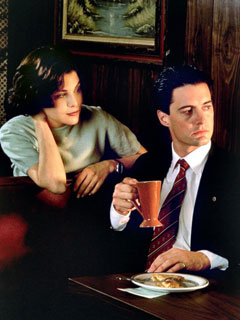 I’m not addicted to coffee. I just like it a lot.
I’m not addicted to coffee. I just like it a lot.
No, seriously. On a few occasions, I’ve tried cutting out coffee for a week or more just to see if I get any withdrawal symptoms, and I don’t. No cravings, headaches, or anything.
As with most bad habits, it was peer pressure that got me into it. At University, there was a lot of socialising in the cafe in the Physics building, and in the kitchen of the Halls of Residence, so I somehow caught the coffee bug.
 When I started work, I did go through an excessive phase. My breakfast at home would consist of a mug of coffee and a chocolate biscuit bar. Or a Mars bar. Then, in work, I kept two coffee mugs. My early morning one (that is to say, nine o’clock (I’m not a morning person)) had a one-pint capacity. Then I’d switch to the normal-sized one, and have coffee at ten, during the communal tea break (with people who had arrived and had their first coffee at seven). And one after lunch. Then one at three for the afternoon break. Sometimes I’d have a late one in the afternoon, when it got quiet. (When all the early birds who started work at seven had gone home. I hate morning people.)
When I started work, I did go through an excessive phase. My breakfast at home would consist of a mug of coffee and a chocolate biscuit bar. Or a Mars bar. Then, in work, I kept two coffee mugs. My early morning one (that is to say, nine o’clock (I’m not a morning person)) had a one-pint capacity. Then I’d switch to the normal-sized one, and have coffee at ten, during the communal tea break (with people who had arrived and had their first coffee at seven). And one after lunch. Then one at three for the afternoon break. Sometimes I’d have a late one in the afternoon, when it got quiet. (When all the early birds who started work at seven had gone home. I hate morning people.)
I’d usually have a final mug after dinner in the evening, making a grand total of seven mugs of strong coffee per day, or eight, if you count the big one as double. About two litres. It’s hard to estimate my total caffeine intake very accurately, but I’d guess that I was on 2000 to 3000 milligrams per day. The national average for coffee drinkers is 200 mg.
 After a while of this, some days I began to notice a kind of feeling of hightened stimulation, or a kind of “buzz” of hyperactivity. Obviously, I was out of my head on the caffeine, and it was probably a good idea to cut down.
After a while of this, some days I began to notice a kind of feeling of hightened stimulation, or a kind of “buzz” of hyperactivity. Obviously, I was out of my head on the caffeine, and it was probably a good idea to cut down.
Caffeine gets into the brain within minutes of ingestion. It works directly on the brain by blocking adenosine receptors, which has the effect of increasing the brain’s stock of dopamine, the “pleasure neurotransmitter”. That’s why it feels good. Very large doses also increase the levels of the neurotransmitter serotonin, as many antidepressant drugs do. There are many other effects throughout the body, such as enhancement of cells’ energy production.
 Coffee, and its main active ingredient, caffeine, have very few negative health effects. Unless you count feeling like a hyperactive squirrel as a negative effect. Coffee can disturb the stomach lining, and very occasionally leads to ulcers. Overdosing on coffee is almost impossible, because your body metabolises it faster than you can drink it. Caffeine tablets are another matter. Fifty to a hundred pills would probably be enough to kill you from ventricular fibrillation. I don’t recommend it.
Coffee, and its main active ingredient, caffeine, have very few negative health effects. Unless you count feeling like a hyperactive squirrel as a negative effect. Coffee can disturb the stomach lining, and very occasionally leads to ulcers. Overdosing on coffee is almost impossible, because your body metabolises it faster than you can drink it. Caffeine tablets are another matter. Fifty to a hundred pills would probably be enough to kill you from ventricular fibrillation. I don’t recommend it.
A surprisingly large number of scientific studies have indicated positive health effects from coffee drinking. Coffee intake is associated with a reduced incidence of Parkinson’s and Alzheimer’s, and for healthy older people, a substantially reduced risk of heart disease. Another benefit for the elderly from coffee drinking is a halving of the incidence of gout, a form of inflammatory arthritis.
For those of us who aren’t quite so advanced in age, coffee has a protective effect against alcohol damage to the liver, which is handy. And psychologically, it’s been shown that a coffee intake actually makes you more open-minded and ready to change your opinions if presented with a good argument. Trust me.